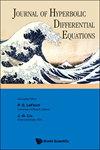带上弱适定双曲边值问题的WKB展开式:导数的随时间损失
IF 0.5
4区 数学
Q4 MATHEMATICS, APPLIED
引用次数: 1
摘要
我们感兴趣的是在条形图中定义的线性双曲方程组的几何光学展开[公式:见正文]。更确切地说,本文的目的是描述边界条件对解的行为的影响。这个问题在[A]中已经提到了。张志刚,带型双曲边值问题的Wkb展开式:自相互作用满足强适定性,数学学报。数学学报,19(5)(2020)(1629-1675)。这里我们不要求边界条件导致强适定问题,而只要求导致弱适定问题(即导数可能损失)。因此,问题是确定在解的能量估计中导数的最小损失是多少。本文的主要结果是表明,借助于几何光学展开,如果条形问题在所谓的[公式:见原文]-类[S]中存在边界。李建军,李建军,双曲型初边值问题的一般类型和转换,中国科学院学报。Soc。《爱丁堡条例》第132(5)(2002)1073-1104条],则衍生品损失应至少随着决议时间的延长而增加。更准确地说,这种损失是由一个随时间增加的阶跃函数限定的,这取决于对波包进行完全再生所需的最小时间。本文章由计算机程序翻译,如有差异,请以英文原文为准。
WKB expansions for weakly well-posed hyperbolic boundary value problems in a strip: Time depending loss of derivatives
We are interested in geometric optics expansions for linear hyperbolic systems of equations defined in the strip [Formula: see text]. More precisely the aim of this paper is to describe the influence of the boundary conditions on the behavior of the solution. This question has already been addressed in [A. Benoit, Wkb expansions for hyperbolic boundary value problems in a strip: Selfinteraction meets strong well-posedness, J. Inst. Math. Jussieu 19(5) (2020) 1629–1675] for stable boundary conditions. Here we do not require that the boundary conditions lead to strongly well-posed problems but only to weakly well-posed problems (that is loss(es) of derivatives are possible). The question is thus to determine what can be the minimal loss of derivatives in the energy estimate of the solution. The main result of this paper is to show, thanks to geometric optics expansions, that if the strip problem admits a boundary in the so-called [Formula: see text]-class of [S. Benzoni-Gavage, F. Rousset, D. Serre and K. Zumbrun, Generic types and transitions in hyperbolic initial-boundary-value problems, Proc. Roy. Soc. Edinburgh Sect. A 132(5) (2002) 1073–1104] then the loss of derivatives shall be at least increasing with the time of resolution. More precisely this loss is bounded by below by a step function increasing with respect to time which depends on the minimal time needed to perform a full regeneration of the wave packet.
求助全文
通过发布文献求助,成功后即可免费获取论文全文。
去求助
来源期刊

Journal of Hyperbolic Differential Equations
数学-物理:数学物理
CiteScore
1.10
自引率
0.00%
发文量
15
审稿时长
24 months
期刊介绍:
This journal publishes original research papers on nonlinear hyperbolic problems and related topics, of mathematical and/or physical interest. Specifically, it invites papers on the theory and numerical analysis of hyperbolic conservation laws and of hyperbolic partial differential equations arising in mathematical physics. The Journal welcomes contributions in:
Theory of nonlinear hyperbolic systems of conservation laws, addressing the issues of well-posedness and qualitative behavior of solutions, in one or several space dimensions.
Hyperbolic differential equations of mathematical physics, such as the Einstein equations of general relativity, Dirac equations, Maxwell equations, relativistic fluid models, etc.
Lorentzian geometry, particularly global geometric and causal theoretic aspects of spacetimes satisfying the Einstein equations.
Nonlinear hyperbolic systems arising in continuum physics such as: hyperbolic models of fluid dynamics, mixed models of transonic flows, etc.
General problems that are dominated (but not exclusively driven) by finite speed phenomena, such as dissipative and dispersive perturbations of hyperbolic systems, and models from statistical mechanics and other probabilistic models relevant to the derivation of fluid dynamical equations.
Convergence analysis of numerical methods for hyperbolic equations: finite difference schemes, finite volumes schemes, etc.
 求助内容:
求助内容: 应助结果提醒方式:
应助结果提醒方式:


